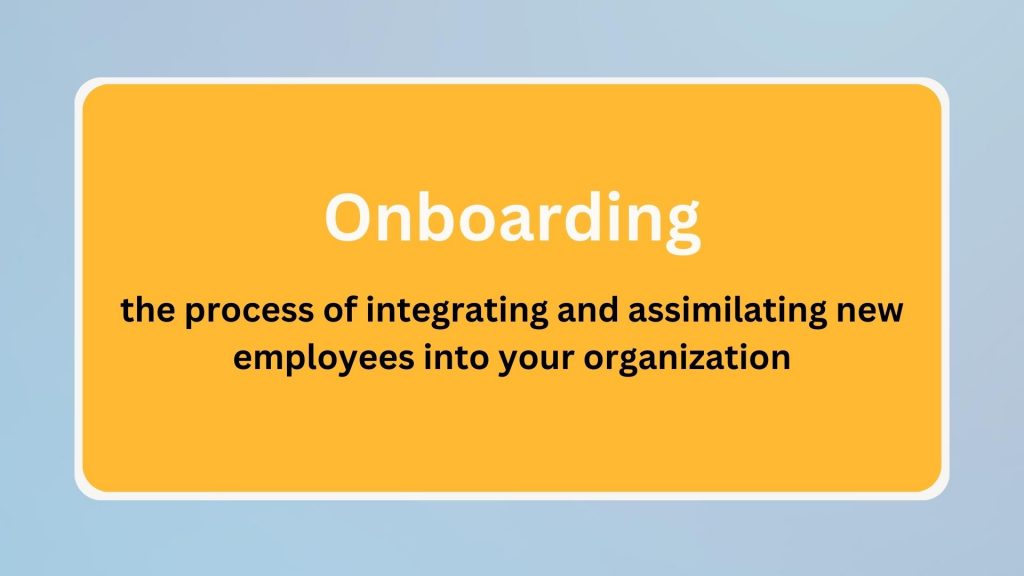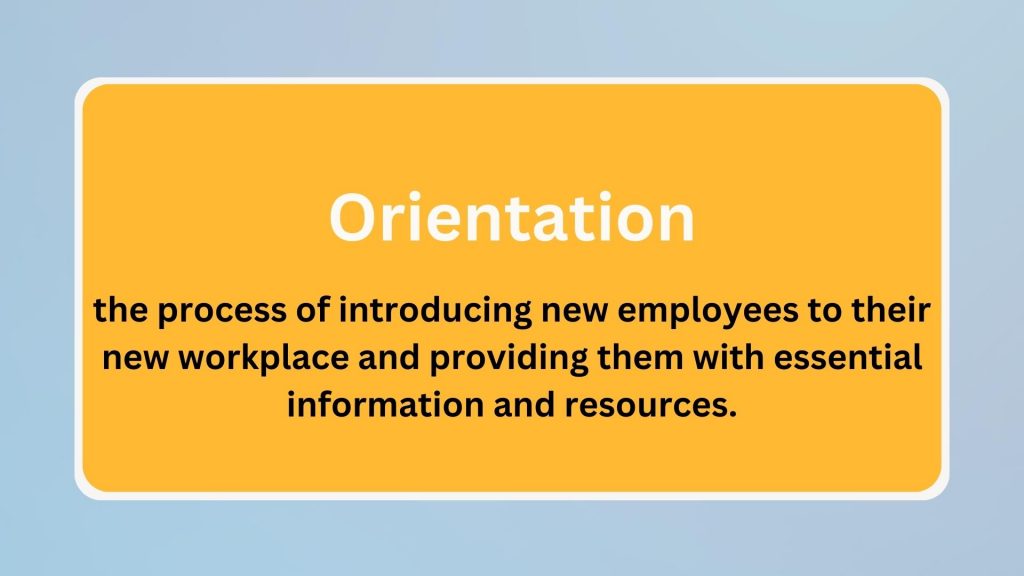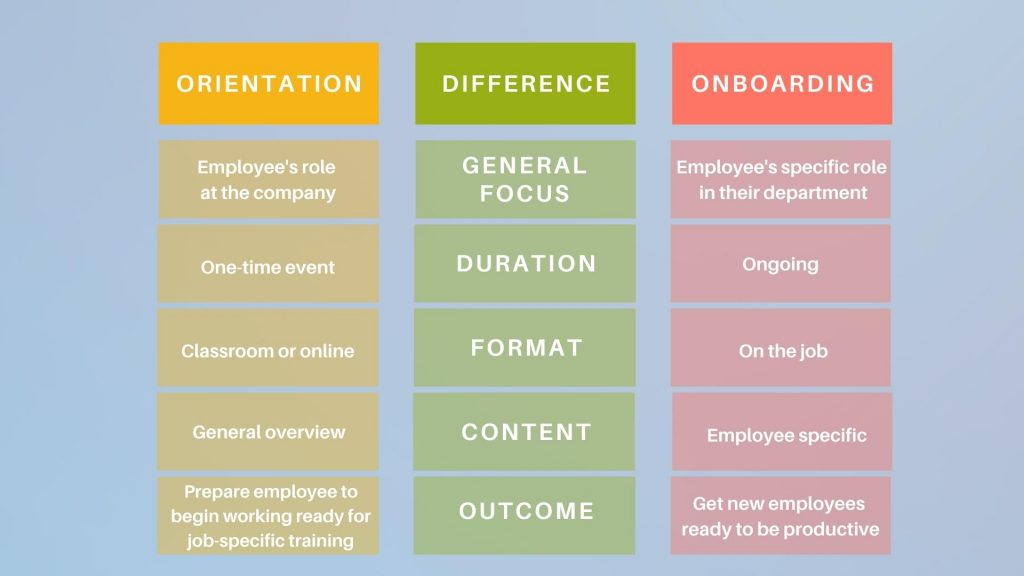Giving new hires a proper welcome is essential to the foundation of an engaged and productive working relationship. First days and weeks are filled with new information and learnings for new employees, so developing a system for onboarding and orientation that adequately supports them is paramount.
Data by SHRM shows that providing a standardized and comprehensive onboarding and orientation process can boost employee productivity by 50%. Which is reason enough to want to ensure your new employees have a positive first impression of your company from the start.
Here, we’ll take a look at the difference between onboarding and orientation so you can properly implement each procedure to support your new employees.
Defining Onboarding and Orientation
You might be thinking, is there any difference between onboarding and orientation? It’s true that the two share many similarities but their key differences lie in their purpose. You can think of onboarding as the overall process (a pie, if you will) and orientation is a component of that process (a slice). Let’s define the two to understand the difference between onboarding and orientation.
Onboarding
Employee onboarding is the process of integrating and assimilating new employees into your organization. It involves providing the necessary support, guidance, training, and resources to help new hires adapt to their roles, become familiar with the company’s culture and values, and develop the skills and knowledge needed for success. The onboarding process begins the moment they accept the job offer, and it can last for several months. The onboarding process aims to facilitate a smooth transition for new employees, foster engagement, build relationships, and align them with the organization’s goals and objectives.

Orientation
Orientation, on the other hand, is the process of introducing new employees to their new workplace and providing them with essential information and resources. It involves sessions that may cover topics such as company history, mission, vision, values, code of conduct, benefits, HR procedures, safety guidelines, and initial training related to the immediate job responsibilities. The orientation process typically takes place in the early days or weeks of employment and aims to familiarize new hires with the company’s policies, procedures, organizational structure, work environment, and basic job expectations.

The Difference Between Onboarding and Orientation: A Comparison Table

Onboarding and Orientation Benefits
We know that onboarding and orientation bear the fruits of increased engagement and a boost in employee productivity. But considering the difference between onboarding and orientation, let’s examine their unique benefits.
The Advantages of Orientation
- A physical (or remote) tour of the office allows new hires to get used to their new workplace.
- Introduction to the company policies and procedures keep new hires informed of expectations and norms.
- Q&A sessions help HR managers have a better understanding of new hires’ concerns and give them an opportunity to address them quickly.
- Materials given to employees serve as a reference guide throughout their employment.
The Advantages of Onboarding
- Employee specific support and job training lead to increased job satisfaction.
- Company culture practices foster a sense of community, leading to higher rates of employee retention.
- Social interactions and team building promote employee buy-in, and result in a stronger sense of ownership over their performance.
Make the Most of Onboarding and Orientation
To make the most of onboarding and orientation, it’s essential to adopt a proactive and engaged approach. Follow these best practices to increase the impact of your employee’s first days, weeks, and months on the job.
Timing
Begin the onboarding process as soon as your new hire confirms their offer acceptance. Conduct orientation within the first few days of employment to provide immediate information and resources. Follow up with the remainder of a well-structured onboarding program that spans several weeks or months to support new hires as they integrate into their roles and your organization.
Dual approach
Recognize the unique differences between onboarding and orientation. Use orientation to cover essential information, policies, and immediate job-related training. Then, transition into onboarding to focus on long-term assimilation, skill development, and cultural alignment.
Clear communication
Communicate expectations, goals, and objectives clearly during both onboarding and orientation. Provide new employees with comprehensive information about your company’s vision, values, and performance standards, ensuring alignment and clarity from the beginning.
Pro tip: Download our employee onboarding checklist to ensure a clear and consistent onboarding process for your employees.
Mentorship
Pair new hires with experienced employees as mentors. This fosters a supportive environment and helps new employees navigate their roles, build relationships, and feel more connected to the organization.
Continuous feedback and evaluation
Regularly check in with new employees to provide feedback, address concerns, and gauge their progress. Encourage open communication and create a feedback loop that helps refine the onboarding and orientation processes for future hires.
Personalized approach
Tailor the onboarding and orientation experiences to individual needs as much as possible. Recognize that each new employee has unique strengths, weaknesses, and learning styles. Customize training and support to optimize their integration and development.
Pro tip: For an extra personal touch, check out these new employee welcome kit ideas for increased engagement.
Engagement opportunities
Incorporate interactive activities, team-building exercises, and networking events throughout the onboarding and orientation processes. This helps new employees connect with colleagues, build relationships, and feel a sense of belonging.
Ongoing support
Provide continuous support beyond the initial onboarding and orientation phases. Offer opportunities for further training, development, and mentorship to ensure long-term success and growth for new employees.
By following these best practices and leveraging the distinct benefits and differences between onboarding and orientation, organizations can create a seamless and effective process that sets new employees up for success in their roles and fosters a positive and productive work environment.
Increase Engagement with Omni
Understanding the key differences between onboarding and orientation allows you to leverage each process to best prepare your new hire.
Both employee onboarding and employee orientation are designed to facilitate the talent management process. When used together, they contribute to the success of your company and the talent within it. Rather than administering these practices through manual processes that require data entry, time consuming follow up communications, and lots of paperwork, consider leveraging Omni’s automated onboarding system to streamline and simplify your onboarding process.
With Omni, you can utilize our expert-built onboarding templates, employee communications, and automated workflows to provide a consistent onboarding experience that increases engagement and retention. All of our onboarding modules are highly customizable to serve the unique needs of your business and employees.
Get in touch with our team to try a 14-day free trial today.


